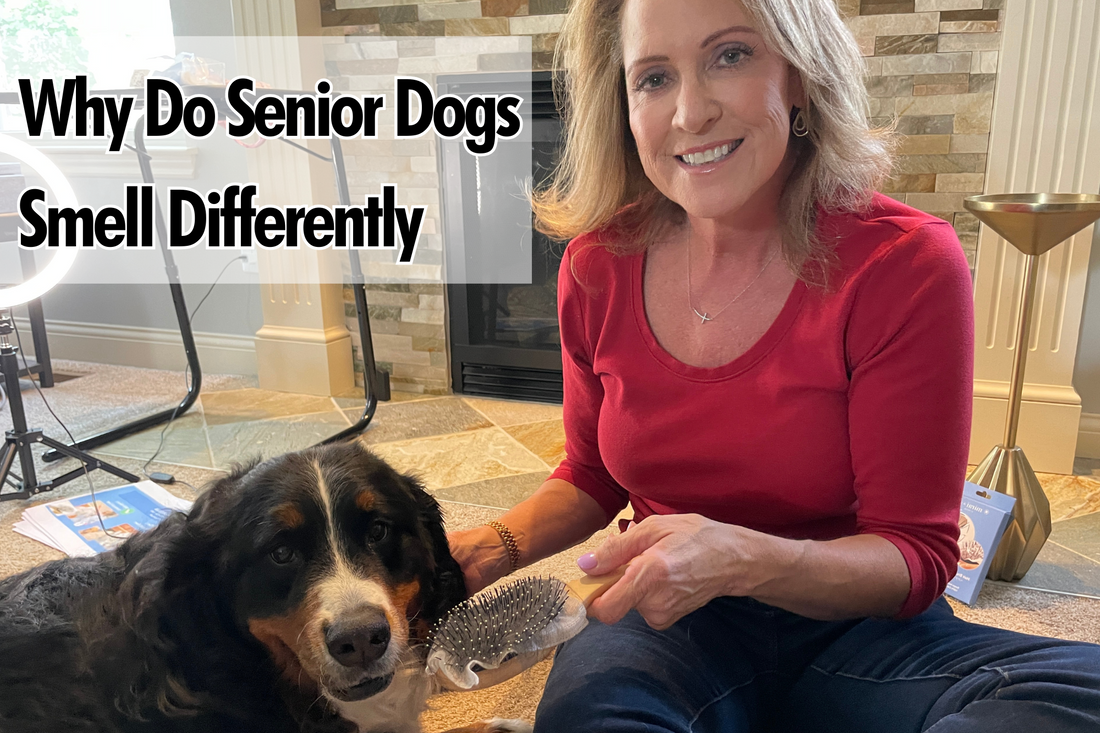
Why Older Dogs Have Nonenal Odor Too: Free Guide to Help Eliminate Aging Odor in Dogs
Share
We know how much our furry companions mean to us as they grow older. They bring us endless love and happiness. But just like humans, aging in pets can also mean a change in their natural scent that's called Nonenal, also known as "aging odor". In this guide, we'll share with you the causes of this odor in our furry friends and a few practical tips to help keep senior pups feeling fresh and comfy.

You might wonder, why does aging odor occur in dogs in the first place? Well, as your dog ages, body odor may gradually become stronger. The reason for this is thought to be a component called Nonenal (now · nee · nuhl), which increases as dogs get older.
Nonenal is an odor-causing substance that occurs when things in the sebaceous glands of the skin oxidize (react with air) and decompose. Although it is secreted even from a young age, the amount increases rapidly as we get older, and the smell becomes more noticeable because it cannot be broken down as easily.
Humans also get Nonenal odor with many comparing the smell to old books, old oil, hay, rotten cheese, or candles. In humans, aging odor often increases after the age of 40, but for dogs it increases rapidly after the age of 7.

Does your dog also have bad breath?
This could be due to periodontal disease. Recently, it is said that 80-90% of dogs over the age of 3 have periodontal disease. Even if you make it a habit to brush their teeth, it is difficult to completely remove stains every day, which can cause the stains to accumulate and gums to recede.
Periodontal disease causes bad breath, so it's not uncommon for dogs to experience this odor as they age. In order to prevent periodontal disease in dogs as much as possible, it is important to keep them clean by brushing their teeth frequently starting from an early age. Stains on your dog's teeth will calcify and turn into tartar within a few days, so it's good to brush your dog's teeth once a day, or at least once every 3 days.
Odor can also be due to adhesion or excrement...

As our furry friends age, their urinary and bowel muscles become less active, leading to occasional accidents. Even small amounts of urine leakage can dry up quickly, so this tends to go unnoticed and can contribute to body odors for your pet. Additionally, any dried excrement can also accumulate and lead to foul odors.
Odors in our dogs can also be due to diseases that are more common in older dogs. Chronic kidney disease is common example because when kidney function declines, the body may not be able to properly process and excrete waste products.
This can cause waste products to accumulate, leading to an ammonia odor coming from the body and mouth. If your dog has a pungent odor, it may be suffering from kidney disease or uremia, so always be sure to check with a licensed veterinarian. Diabetes, another common disease in older dogs, causes their urine to have a strong odor.
What can you do today to improve your old dog's odor?

To help you prevent and improve your furry companion's scent, it's important to take care of your dog's body frequently every day.
1. Oral Hygiene for Fresh Breath: To prevent bad breath, brush your dog's teeth at least every 2 to 3 days.
2. Stay Clean Around the Back: With aging, small urine and feces leaks can occur. Make it a habit to gently wipe around your dog's anus to keep them clean. Our alcohol and fragrance-free wipes are great for this task! You can also wipe their skin with a damp towel to remove excess sebum and dirt.

3. Gentle Cleaning Routine: For older dogs, a full-body bath can be tiring. Opt for regular brushing with our biodegradable hair brush liners. Need a brush? Select the set option and give your loyal companion a spa day - people have told us the bristles soothe their pet like it's being pampered at the spa!

Trust Mirai to keep your loyal companion fresh and odor-free with natural Persimmon products - just like we do for you!
